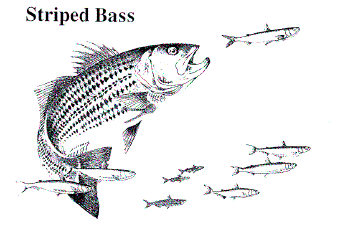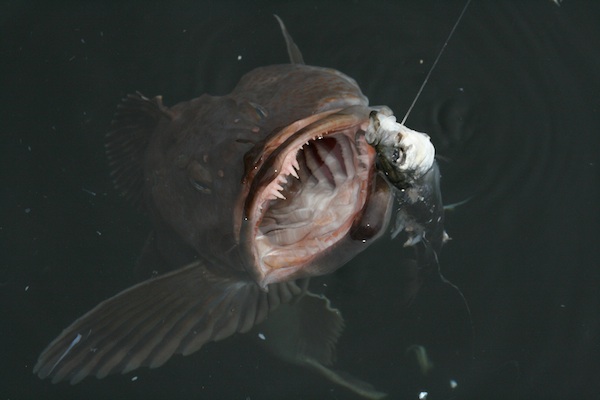Striper future up in air after DFG, water exporters settle

by Rich Holland
4-1-2011
Website
No holds barred on striped bass?
Sources have confirmed that the California Department of Fish and Game has reached an agreement with the the Coalition for a Sustainable Delta that could strip away any catch restrictions on striped bass and it was reported that on Friday, April 1 the judge overseeing the case agreed to the settlement.The agreement could have long-reaching effects on other non-native species in the Delta, such as largemouth bass.
The settlement is the result of a lawsuit filed in 2008 by the coalition, a front group for water districts that pump water out of the Delta for use as far away as Southern California. The Delta pumps have been turned off and water shipments curtailed to protect endangered Delta smelt and winter and spring Chinook salmon runs.
Seizing on biological opinions that claim striped bass are the number one predators of salmon in the Delta and the Sacramento River system, the water exporters went to court to force the DFG to remove the 2-fish limit, 18-inch minimum size sportfish regulations. There is no doubt that striped bass do eat other fish, and DFG experts in court admitted the stripers could take as much as 25-50 percent annually of both the endangered Sacramento River winter-run and the threatened Central Valley spring-run Chinook salmon populations within the Delta.
There is plenty of speculation, however, as to whether removal of catch restrictions on striped bass would achieve the desired result of improving smelt and salmon populations. Two of the most prominent fisheries scientists in California, Peter Moyle and William Bennett of UC Davis, published a paper stating otherwise.
"If the striped bass is indeed the dominant predator on other fishes (the reason for a control program), then their decrease should have the most impact on species that are most frequently consumed," they wrote. "The 'release' from predation by striped bass is highly likely to benefit many other alien fish that are also known predators and competitors on endangered fishes. For example, Mississippi silversides are important in the diets of 1-3 year old striped bass, so bass predation may be regulating the silverside population. Fewer striped bass could result in greater silverside numbers, which may have negative effects on delta smelt through predation on eggs and larvae."
According to the agreement between the coalition and the DFG, a comprehensive proposal to address striped bass predation in the Delta will be developed by state and national fishery management agencies that will include the following components:
Appropriate changes to regulations that protect non-native striped bass at the expense of threatened and endangered native fish;
Development of an adaptive management plan to research and monitor the overall effects on listed species; and
Creation of a $1 million research program focused on predation of protected species.
Any focus on predation could turn attention to another highly popular Delta game fish, the largemouth bass, noted Moyle and Bennett.
All predation losses of salmon tend to be blamed on striped bass with the effects of other predators usually being regarded as insignificant. In fact, there are a multitude of other predators on juvenile salmon in the system, from birds (e.g., mergansers, cormorants, terns) to other fish, both native and non-native, including juvenile steelhead," wrote the scientists. "The most abundant fish predator in the Delta today is probably largemouth bass--popular subjects of major catch-and-release fishing tournaments. If a control program for striped bass can be justified, then presumably one should be instituted for other predators as well."
Meanwhile, fishermen will tell you that numbers of all species of fish -- salmon, stripers, bass, steelhead and smelt -- declined precipitously after the Delta pumps were first turned on. Striped bass in this case are the proverbial scapegoat.
"Seven species of fish in the Delta are listed as threatened or endangered, including Delta smelt, salmon and steelhead. Although the ultimate cause of decline in these species is adverse water management throughout the Central Valley, there is a constant search for ways to increase their numbers without any water costs," noted Moyle and Bennett.
Which sport fish will be the next target of the water wars?
Sources have confirmed that the California Department of Fish and Game has reached an agreement with the the Coalition for a Sustainable Delta that could strip away any catch restrictions on striped bass and it was reported that on Friday, April 1 the judge overseeing the case agreed to the settlement.The agreement could have long-reaching effects on other non-native species in the Delta, such as largemouth bass.
The settlement is the result of a lawsuit filed in 2008 by the coalition, a front group for water districts that pump water out of the Delta for use as far away as Southern California. The Delta pumps have been turned off and water shipments curtailed to protect endangered Delta smelt and winter and spring Chinook salmon runs.
Seizing on biological opinions that claim striped bass are the number one predators of salmon in the Delta and the Sacramento River system, the water exporters went to court to force the DFG to remove the 2-fish limit, 18-inch minimum size sportfish regulations. There is no doubt that striped bass do eat other fish, and DFG experts in court admitted the stripers could take as much as 25-50 percent annually of both the endangered Sacramento River winter-run and the threatened Central Valley spring-run Chinook salmon populations within the Delta.
There is plenty of speculation, however, as to whether removal of catch restrictions on striped bass would achieve the desired result of improving smelt and salmon populations. Two of the most prominent fisheries scientists in California, Peter Moyle and William Bennett of UC Davis, published a paper stating otherwise.
"If the striped bass is indeed the dominant predator on other fishes (the reason for a control program), then their decrease should have the most impact on species that are most frequently consumed," they wrote. "The 'release' from predation by striped bass is highly likely to benefit many other alien fish that are also known predators and competitors on endangered fishes. For example, Mississippi silversides are important in the diets of 1-3 year old striped bass, so bass predation may be regulating the silverside population. Fewer striped bass could result in greater silverside numbers, which may have negative effects on delta smelt through predation on eggs and larvae."
According to the agreement between the coalition and the DFG, a comprehensive proposal to address striped bass predation in the Delta will be developed by state and national fishery management agencies that will include the following components:
Appropriate changes to regulations that protect non-native striped bass at the expense of threatened and endangered native fish;
Development of an adaptive management plan to research and monitor the overall effects on listed species; and
Creation of a $1 million research program focused on predation of protected species.
Any focus on predation could turn attention to another highly popular Delta game fish, the largemouth bass, noted Moyle and Bennett.
All predation losses of salmon tend to be blamed on striped bass with the effects of other predators usually being regarded as insignificant. In fact, there are a multitude of other predators on juvenile salmon in the system, from birds (e.g., mergansers, cormorants, terns) to other fish, both native and non-native, including juvenile steelhead," wrote the scientists. "The most abundant fish predator in the Delta today is probably largemouth bass--popular subjects of major catch-and-release fishing tournaments. If a control program for striped bass can be justified, then presumably one should be instituted for other predators as well."
Meanwhile, fishermen will tell you that numbers of all species of fish -- salmon, stripers, bass, steelhead and smelt -- declined precipitously after the Delta pumps were first turned on. Striped bass in this case are the proverbial scapegoat.
"Seven species of fish in the Delta are listed as threatened or endangered, including Delta smelt, salmon and steelhead. Although the ultimate cause of decline in these species is adverse water management throughout the Central Valley, there is a constant search for ways to increase their numbers without any water costs," noted Moyle and Bennett.
Which sport fish will be the next target of the water wars?
Rich Holland's Roundup
< Previous Report Next Report >
< Previous Report
Next Report >

3-31-2011
Looks like June Lake will be ready for the opener coming up on the last Saturday in April!...... Read More

3-30-2011
The timing is fantastic for the lingcod opener and the SportfishingReport.com charter Sunday on J.J. Gerritsen's Apollo is filling fast....... Read More
More Reports
June Lake is about 70% ice free
June Lake
3-31-2011
Looks like June Lake will be ready for the opener coming up on the last Saturday in April!...... Read More

3-30-2011
The timing is fantastic for the lingcod opener and the SportfishingReport.com charter Sunday on J.J. Gerritsen's Apollo is filling fast....... Read More
80

